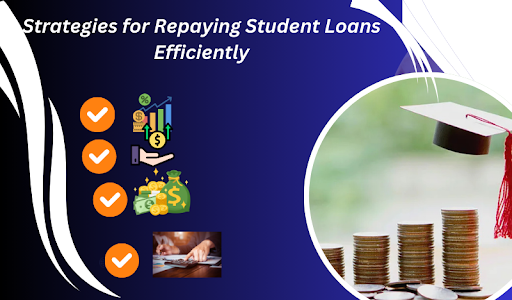The burden of student loans can make it more difficult for college graduates to buy a home, spurring much political debate about the problem. Meanwhile, Americans must develop a plan to pay their student loans, which is critical to their long-term financial health. By adopting the right strategies, students can minimize interest costs, pay off your loans faster, and achieve financial freedom sooner.

Here are some key strategies for Repaying Student Loans Efficiently
Calculate Your Total Debt: As with any type of debt, you should first know the total amount you owe. Only by knowing the amount of your total debt can you develop a plan to pay it down, consolidate it, or possibly apply for and receive forgiveness.
Make Extra Payments: Whenever possible, make extra payments towards the principal amount of your loan.
Know the Terms: As you sum up the size of your debt, become familiar with the terms of each loan. Each may have a different Interest rate and different repayment rules.
Refinance or Consolidate Loans: If you have multiple loans with different interest rates, consider consolidating or refinancing them into one loan with a lower interest rate.
Prioritize High-Interest Loans: Focus on paying off loans with the highest interest rates first to save money over time.
Explore Loan Forgiveness: In some extreme circumstances, you may be able to apply for debt forgiveness or the discharge of your student loan.
Public Service Loan Forgiveness is the most common way people apply to have their student loans forgiven.
Eligibility for Public Service Loan Forgiveness
- Only loans from the Federal Direct Loan Program are eligible for PSLF.
- You must make 120 qualifying monthly payments while working full-time for a qualifying employer.
| Eligible | Ineligible |
| U.S. government organizations at any level (federal, state, local, or tribal), including the U.S. military. | For-profit organizations, including for-profit contracted organizations |
| Non-profit organizations that are tax-exempt under Section 501(c)(3) of the U.S. tax code. | Labor unions |
| Other nonprofits that focus most of their employees on providing certain public services. | Partisan political organizations |
Alternatives for loan repayment
- Graduated repayment: This increases your monthly payments every two years over the 10-year life of the loan.
- Extended repayment: This allows you to stretch out your loan over a longer period of time, such as 25 years rather than 10 years, which will result in a lower monthly payment.
Income-Driven Repayment (IDR): IDR plans calculate your monthly payment amount based on your income and family size. So if your income increases, so does your payment amount. This can make loan repayment more manageable if the borrower has a low income after graduation.
Deferment: if you’re having trouble repaying your loans, you may consider requesting a loan deferment or forbearance, With a loan deferment, you can temporarily stop making payments. During deferment, interest may or may not accrue, depending on the loan type.
Create a Budget: The 50-30-20 budgeting rule allocates 50% for essentials, 30% for discretionary spending, and 20% for savings/debt repayment – ideal for managing student loans.
Make Extra Payments: Instead of making one monthly payment, divide it in half and pay bi-weekly. This results in 26 half-payments over the year—equivalent to making one extra full payment annually.
Consider Refinancing: Refinancing combines federal and/or private loans into a single new loan. Consolidating combines federal loans into a single new loan amount. The decision to refinance or consolidate depends on your short-term and long-term financial goals.
Graduated repayment: This increases your monthly payments every two years over the 10-year life of the loan. This plan allows for low payments early on, accommodating entry-level salaries. It also assumes you will get raises or move on to better-paying jobs as the decade progresses.
Extended repayment: This allows you to stretch out your loan over a longer period of time, such as 25 years rather than 10 years, which will result in a lower monthly payment.
What Happens if You Do Not Pay Off Your Student Loans?
- Not paying off your student loans is extremely damaging to your credit profile.
- Loss of Eligibility for Financial Aid.
- It’s the same as defaulting on any other loan.
- This will make it harder to borrow in the future, which includes getting a car loan or a mortgage.
- Defaulting on your loan can hurt your credit score.
Read Also
- Navigating Student Loans as an International Student
- Financial Literacy: Preparing for Student Loans Before College
FAQs
1. What is the first Strategies for Repaying Student Loans Efficiently?
Ans: The first step is to calculate your total debt.
2. How can I reduce my student loan interest costs?
Ans: To reduce interest costs, make extra payments towards the principal whenever possible.
3. What is loan refinancing?
Ans: Refinancing combines federal and/or private loans into a single new loan. Consolidating combines federal loans into a single new loan amount.
4. What is an Extended repayment Plan?
Ans: This allows you to stretch out your loan over a longer period of time, such as 25 years rather than 10 years, which will result in a lower monthly payment.
5. What is a graduated repayment plan?
Ans: This increases your monthly payments every two years over the 10-year life of the loan. This plan allows for low payments early on, accommodating entry-level salaries.

My self Anita Sahani. I have completed my B.Com from Purbanchal College Silapathar. I am working in Dev Library as a Content Manager. A website that provides all SCERT, NCERT 3 to 12, and BA, B.com, B.Sc, and Computer Science with Post Graduate Notes & Suggestions, Novel, eBooks, Health, Finance, Biography, Quotes, Study Materials, and more.








